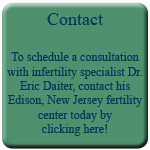Ovulation and the Menstrual Cycle
The first day of menses (significant menstrual flow) marks the onset of the menstrual cycle. The human menstrual cycle normally has menstrual cycle intervals of about 28-30 days and is ultimately designed allow a woman to become pregnant. During a menstrual cycle, an egg develops within the ovary and the uterine endometrial lining is prepared for embryo implantation. If no pregnancy forms, then the prepared lining of the uterus is shed as the menstrual flow and the cycle begins once again.
The menstrual cycle can be divided into parts based on their function. The initial part of the menstrual cycle is called the “follicular phase” since eggs develop within ovarian cysts called follicles. The ovulation part of the menstrual cycle is when a mature egg is triggered (signaled hormonally) to become fertilizable and is then released from the ovary into the pelvis. The “luteal phase” follows ovulation and the follicular cyst that contained the egg during the follicular phase changes to produce high amounts of progesterone (the progesterone producing cyst is called a corpus luteum cyst), which then prepares the uterine lining for embryo implantation. During the luteal phase of the menstrual cycle there is a 4-5 days “window of uterine receptivity” during which time a developing preimplantation embryo (fertilized egg) within the uterus is able to implant and develop into a normal pregnancy. If a pregnancy does develop, then progesterone production remains elevated throughout pregnancy. If pregnancy does not occur, then the corpus luteum cyst disintegrates, progesterone concentrations fall, and the lining of the uterus is shed.
Problems with ovulation can reduce fertility. These may include hormonal imbalances involving thyroid hormones or prolactin, release of an egg from a follicle (ovarian cyst) that is relatively small and subsequently will produce inadequate progesterone (a luteal phase defect), or genetic problems within the DNA of the egg.
At The NJ Center for Fertility and Reproductive Medicine, LLC, Dr. Daiter is experienced in identifying and treating ovulation problems that can result in reduced fertility. For an appointment to discuss your ovulation or fertility concerns with Dr. Daiter, please call the office at 908 226 0250. Visit us on the web at http://www.drericdaitermd.com http://www.ericdaiter.com or http://www.infertilitytutorials.com
